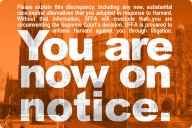You have /5 articles left.
Sign up for a free account or log in.
Many high school students are surprised when they start to receive mail from colleges and universities that see them as prospective students. The students have -- frequently unwittingly -- given permission to the College Board or ACT to pass along information about those who have scored at certain levels on their tests, and who have expressed certain academic interests.
Another big player in the business of selling names to colleges is the National Research Center for College and University Admissions, generally known by its initialism, NRCCUA. ACT purchased NRCCUA last year. NRCCUA compiles its names through surveys distributed in high schools, not test scores.
When high school students complain about the barrage of mail they receive from colleges, counselors frequently tell them that they need to be careful about which boxes they check when filling out forms. But are the students really given enough information?
This week, a counselor at a public high school in New Jersey shared with colleagues (and Inside Higher Ed) his view that one of the NRCCUA surveys of students is deceptive (NRCCUA conducts several surveys). The counselor, Scott White, wrote about the survey whose cover page is the photo above.
White wrote that students would have no idea what the 2019 National Student Report to Congress really is. Further, he said that principals (who must sign off first) might also be confused by language in the letter to them that says, "Your students are depending on you to make their voices heard in the halls of Washington."
White said that, despite a few questions about political issues, this is the basic NRCCUA survey, just with packaging that might encourage participation from students who might not want to have their names sold. "They only mention in the typical microscopic print that they are collecting and sharing the names and phone numbers provided with educational commercial marketers," White wrote.
Todd C. Boullion, chief marketing officer for NRCCUA, said in an interview that he thought it was "a bit of a stretch" to say that students are being deceived. He acknowledged that Congress never asked for the report, and that it is not an official survey of any kind. But he said that the results are sent to lawmakers.
But he said that the forms, when taken in their entirety, "clearly communicate" that NRCCUA uses the survey for other purposes as well. And Boullion said that students benefit from having their names given to colleges.
"Some kids are fortunate, but there are a lot of kids that aren't connected to colleges, so the intent is to help students have a dialogue with schools that are potentially a good fit."








